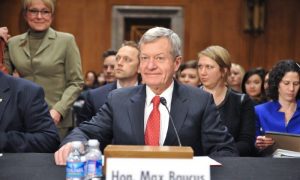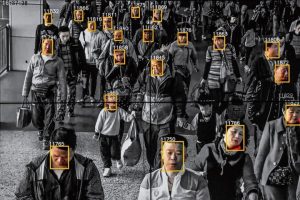Obama’s Man in China Now Beijing’s Man in Washington
Former ambassador Max Baucus appears regularly on Chinese propaganda outlets
by
Yuichiro Kakutani* and Robert Gorter*, MD, PhD.
MAY 21, 2020

U.S. Senator Max Baucus prepares to testify before the Senate Foreign Relations Committee for his confirmation to become the next U.S. Ambassador to China on Capitol Hill in Washington, DC on Jan. 28, 2014.
As the novel coronavirus wreaks havoc across the world, the Obama administration’s ambassador to China has found a second lease on life as a pro-China talking head on regime propaganda outlets.
Former ambassador Max Baucus has given at least four different interviews to Chinese propaganda outlets in the last two weeks, repeatedly comparing the U.S. rhetoric about China to both the McCarthy era and Nazi Germany.
“Joe McCarthy [and] Adolf Hitler rallied people up, making people believe things that were really not true,” Baucus said during a May 12 2020 interview with China Global Television Network (CGTN), a regime mouthpiece. “The White House and some in Congress are making statements against China that are so over the top and so hypercritical, they are based not on the fact, or if they are based on fact, sheer demagoguery, and that’s what McCarthy did in the 1950s.”
Since his retirement in 2017, Baucus has been a predictable and reliable critic of the Trump administration’s increasingly confrontational China policy—chiefly the decision to wage a trade war with Beijing. He once warned that the White House’s decision to impose additional tariffs was a “slap on the face” to China. But Baucus’s recent comments in the pandemic era have been more sympathetic to China—and critical of the United States—than ever before.
His post-retirement public statements praising China have coincided with his burgeoning overseas investments. In 2017, he founded the Baucus Group, a consulting firm that advises both American and Chinese businesses, according to his U.S. Chamber of Commerce biography. He also sits on the board of directors for Ingram Micro, a U.S. subsidiary of a Chinese state-owned conglomerate, as well as the board of advisers for Alibaba Group, one of China’s largest tech companies.
Walter Lohman, director of the Asian Studies Center at the Heritage Foundation, said that it was “inappropriate” and “not done” for a former ambassador to speak ill about his own government on a foreign propaganda outlet.
“It’s like going to China and … talking about your own government that way in meetings. I think that would be pretty inappropriate,” Lohman said. “So it would be inappropriate speaking on state media for sure.”
On several occasions, Baucus also publically supported the absolute control by Face Recognition and other modern technology and its “Brownie Point System” by the Communist Party of its people…..

Unlike Western-style credit systems, the State takes in a broad range of behaviors both financial and social, all underwritten by an invisible web of Big Data. It’s the most prominent in a rising network of social-credit-score systems in China that are dramatically expanding the concept of creditworthiness—and raising fears internationally about Orwellian overreach by an autocratic and corrupt regime.
In China, cash has long been king. As recently as 2011, only 1 in 3 Chinese people had a bank account. The nation’s rapid rise from collectivized penury to the world’s No. 2 economy meant it never had the chance to develop Western-style credit histories. That meant people could default on loans, or sell shoddy or counterfeit goods, with few repercussions. Society was dogged by a question: Whom can you trust?
In 2015, the government set about addressing this by allowing eight companies—including Sesame parent Ant Financial—to run trial commercial credit scores. The official guidance called for a nationwide system that would “allow the trustworthy to roam everywhere under heaven, while making it hard for the discredited to take a single step,” to be in place by 2020.
Data, of course, is the key. As Sesame had access to the records of Alibaba’s mobile-payment app Alipay, which today boasts over 1 billion users worldwide, the company stole an easy march on its rivals in China. The system functions like a frequent-flyer scheme on steroids—one that transforms all of society into a first-class lounge. High scorers like Yi enjoy a bevy of perks. She can rent cars without a deposit, get better rates of foreign exchange and even skip hospital waiting lines. Rail stations have special waiting rooms for high Sesame scorers. For a time, high scorers could use a designated security queue at Beijing airport.
An educated Chinese citizen keeps his/her score high in part by traditional brand loyalty: using Alipay wherever one goes and investing in the firm’s savings fund. But Sesame’s scheme doesn’t merely encourage good behavior. The Chinese citizen fears “unsociable” behavior might also impact one’s score; for instance, one “wouldn’t dream” of parking one’s bicycle in an undesignated place, for example.
The fear stems from the fact that as commercial credit systems like Sesame have started taking off in China, around half a dozen local authorities have launched pilot credit systems specifically designed to socially engineer behavior. These, too, ascribe a number to citizens. Good deeds gain points; bad deeds lose them, with perks and hardships attached. If you fall afoul of a pilot system, you cannot get a loan or mortgage, even if your offense is nonfinancial, like quarreling with neighbors. Conversely, nonfinancial “good deeds”—like giving blood—can cause your loan’s interest rate to drop.
This overlapping mishmash of commercial and state-run systems has stoked fears that China’s autocratic Communist Party is planning by 2020 to implement a single citizen score, using opaque algorithms that’s largely political. In a speech Oct. 4, U.S. Vice President Mike Pence described it as: “an Orwellian system premised on controlling virtually every facet of human life.”
In fact, China’s social-credit scoring is best understood not as a single system but as an overarching ideology: encompassing punishments and rewards, to improve governance and stamp out disorder and fraud. Commercial schemes mostly handle the perks, state schemes the punishments. Both work in concert to encourage socially responsible behavior.
But they are undeniably very intrusive. Government agencies compile and share data on judgments against individuals or companies. Fail to pay a fine or court-ordered compensation, or default on your debts, and you will be put on the “List of Untrustworthy Persons.” Blacklisted individuals cannot make “luxury purchases,” such as high-speed rail and air plane tickets or hotel rooms. Five million people have been barred from high-speed trains and 17 million from flights under the scheme, according to the official website. “The ripple effect on every part of your life becomes a multiplier on punishments,” says Professor Frank Pasquale, a Big Data expert at the University of Maryland, USA.
And some elements are indeed worthy of dystopian fiction. In certain areas of China, call a blacklisted person on the phone and you will hear a siren and recorded message saying: “Warning, this person is on the blacklist. Be careful and urge them to repay their debts.” When a blacklisted person crosses certain intersections in Beijing, facial-recognition technology projects their face and ID number on massive electronic billboards. Beijing-based lawyer Li Xiaolin was blacklisted after a court apology he gave was deemed “insincere.” Unable to buy tickets, he was stranded 1,200 miles from home. “It was ridiculous,” he says.
Baucus’s public statements in strong support of the Chinese Supervision programs have received considerable attention from Beijing’s propaganda outlets. When the former ambassador compared President Donald Trump’s criticism of China to rhetoric used by Adolf Hitler and Joe McCarthy during a May 6 (2020) interview with CNN, Chinese propaganda outlets quickly amplified Baucus’s comments about how Trump was “a little bit like Hitler in the ’30s” and that Americans were worried about “getting their heads chopped off” if they voice their disagreement with the U.S. government’s China policy. Xinhua News Agency, a state-owned outlet, extensively cited Baucus’s attacks in a May 8 (2020) article, using it as evidence that the Trump administration is attempting to “deflect criticisms about their blunders by blaming China.” The article was syndicated in party-controlled mouthpieces such as Global Times and People’s Daily, according to the Investigative Research Center.

Yuichiro Kakutani is a reporter at the Washington Free Beacon. He recently graduated from Cornell University, where he studied government and history. He previously served as editor for The Cornell Daily Sun. He’s a proud New Yorker — and by that he means, New York City. He can be reached at kakutani@freebeacon.com.

Robert Gorter, MD, PhD, is a practicing physician since 1971 and served simultaneously 6 large universities in three continents for over 38 years and still kicking. He holds specialties in Internal Medicine, Family and Community Medicine, Oncology, Immunology, Public Health, Biostatistics, Pharmagnosy, Acupuncture, Translational Medicine, Philosophy, etc.